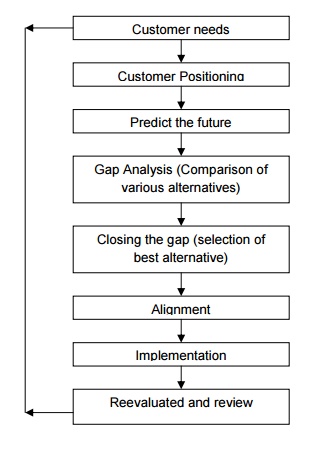Chapter: Mechanical : Total Quality Management (TQM) : Quality Management
Seven Steps to Strategic Quality Planning

STRATEGIC QUALITY PLANNING
Goals – Long term planning (Eg : Win the war)
Objectives – Short term planning (Eg : Capture the bridge)

Goals
should
Ø Improve
customer satisfaction, employee satisfaction and process
Ø Be based
on statistical evidence
Ø Be
measurable
Ø Have a
plan or method for its achievement
Ø Have a
time frame for achieving the goal
Ø Finally,
it should be challenging yet achievable
SEVEN
STEPS TO STRATEGIC QUALITY PLANNING
In order to integrate quality with the strategic planning
process, a systematic and sequential procedure has to be adopted. There are
seven basic steps to strategic process planning. They are
Step 1. Customer Needs
The basic step is the
identification of customers and their wants and needs. An organization must
seek its customers’ requirements, expectations and assess future trends before
developing a
strategic plan.
Step 2. Customer Position
The second step requires the
planners to determine its positioning with regards to its customers. Various
alternatives such as whether the organization should give up, maintain or
expand market position should be considered. In order to become successful, the
organization should concentrate and consolidate its position in its areas of
excellence.

Step 3. Predict the Future
Next, the planners must predict
future conditions that will affect their product or service: To help predicting
the future, the tools such as demographics, economic forecasts, and technical
assessments or projections may be used.
Step 4. Gap Analysis
In this step, the planners must
identify the gaps between the current state and the future state of the
organization. This concept is also known as value stream mapping.
For identifying the gaps, an analysis of the core values and concepts and other
techniques may be used.
Step 5. Closing the Gaps
Now the planners should develop a
specific plan to close the gaps. This process is also termed as Process
improvement. By assessing the relative importance and relative
difficulty of each gap, planners can close the gaps.
Step 6. Alignment
Now the revised plan should be aligned with the mission, vision, and core values and concepts of the organization. Organization should embrace quality as an essential ingredient in their vision, mission, and objectives.
Step 7. Implementation
In order to implement the action
plan, resources must be allocated to collecting data, designing changes, and
overcoming resistance to change. Also the planners should monitor and assess
the result of the strategic plan.
Since quality is a continuous
improvement process, one has to reassess and renew the strategic plans
periodically. So it is a cyclic process. Figure summarizes the strategic
planning cycle.
Related Topics